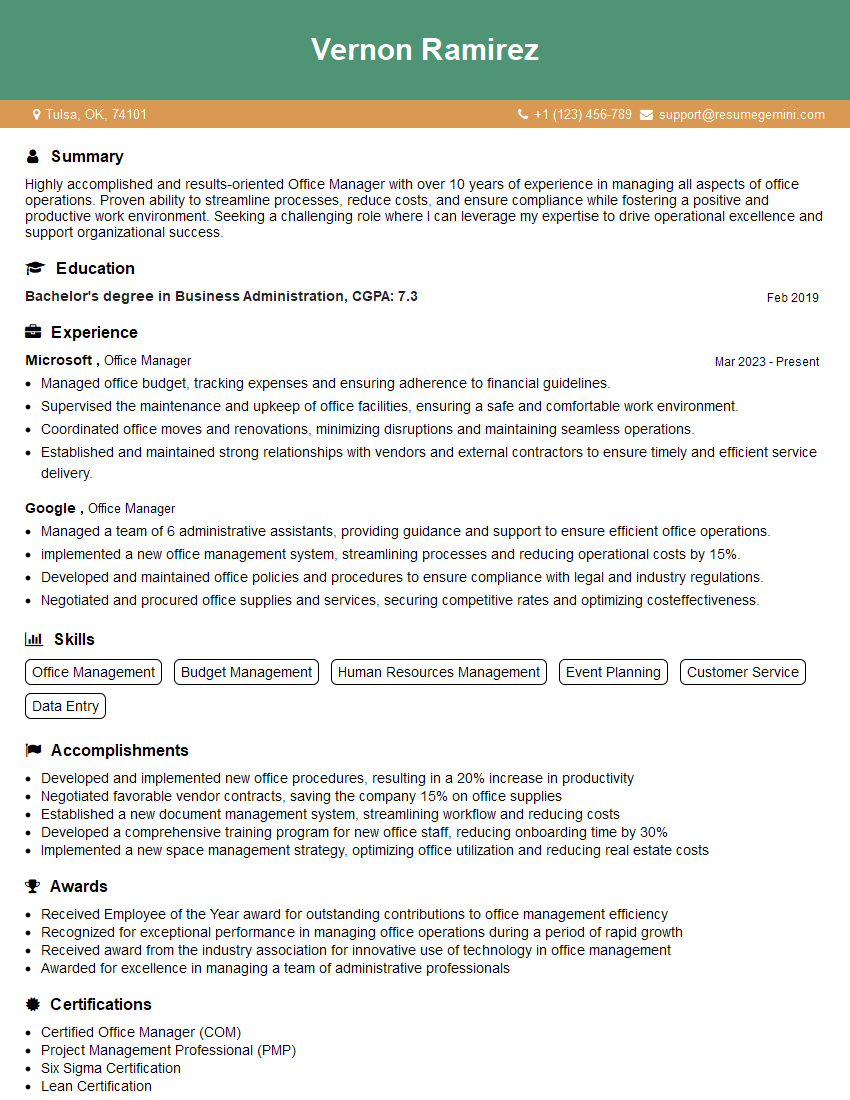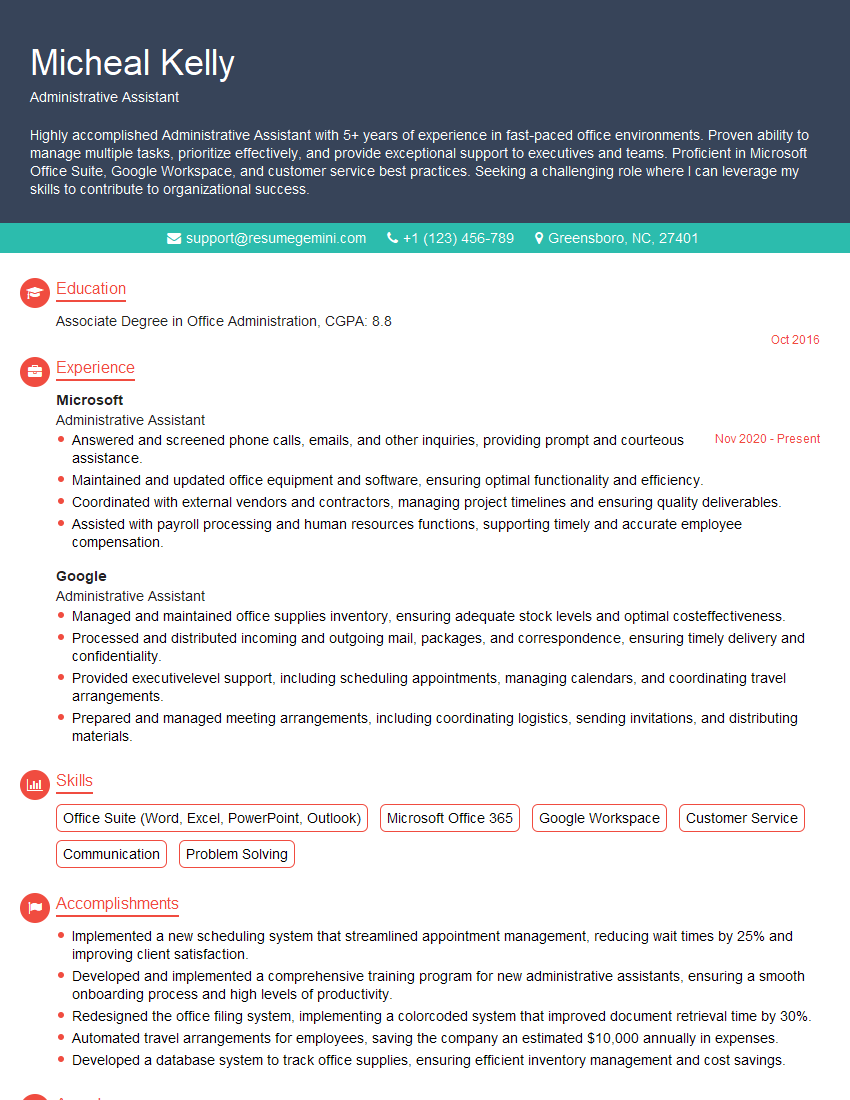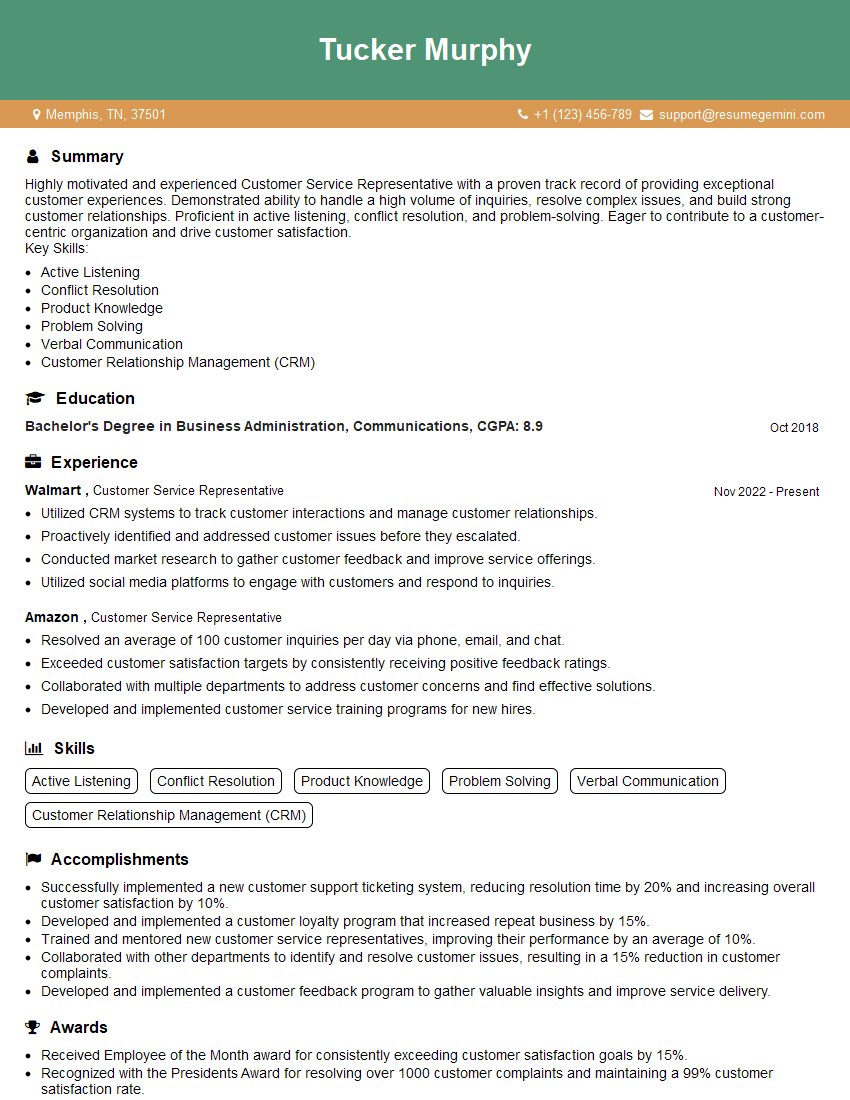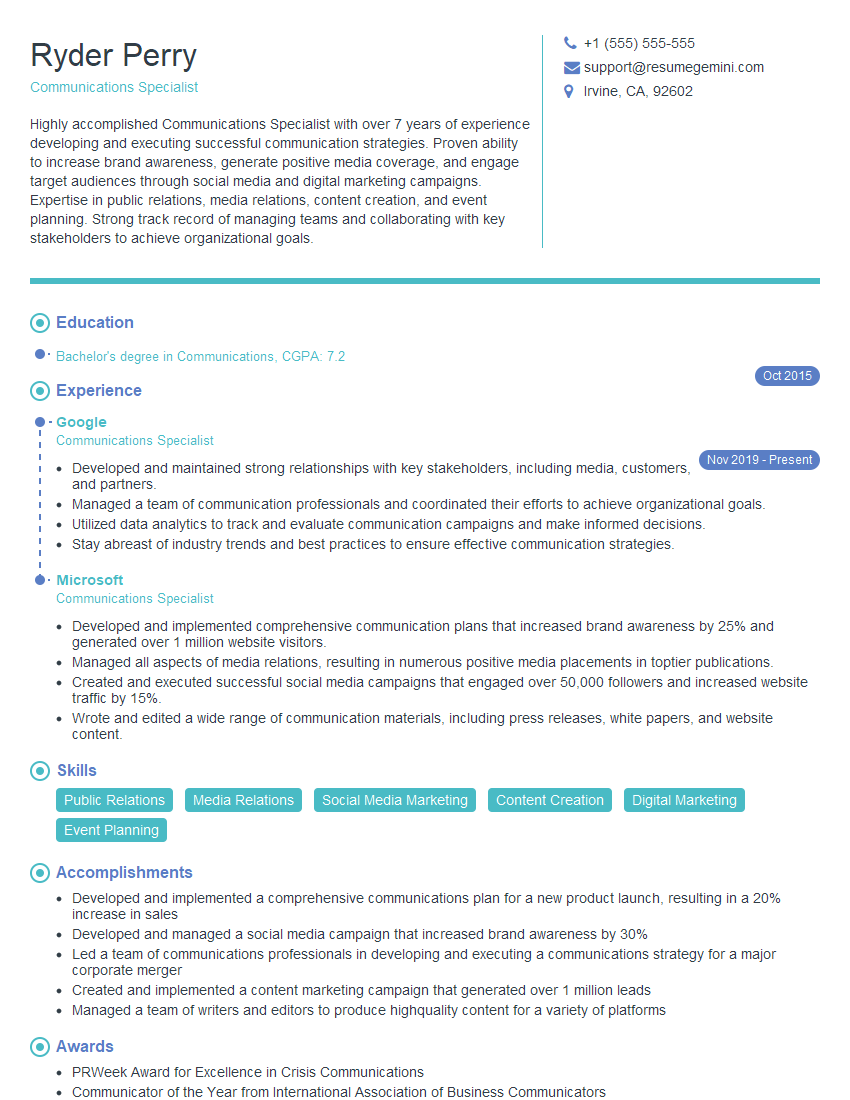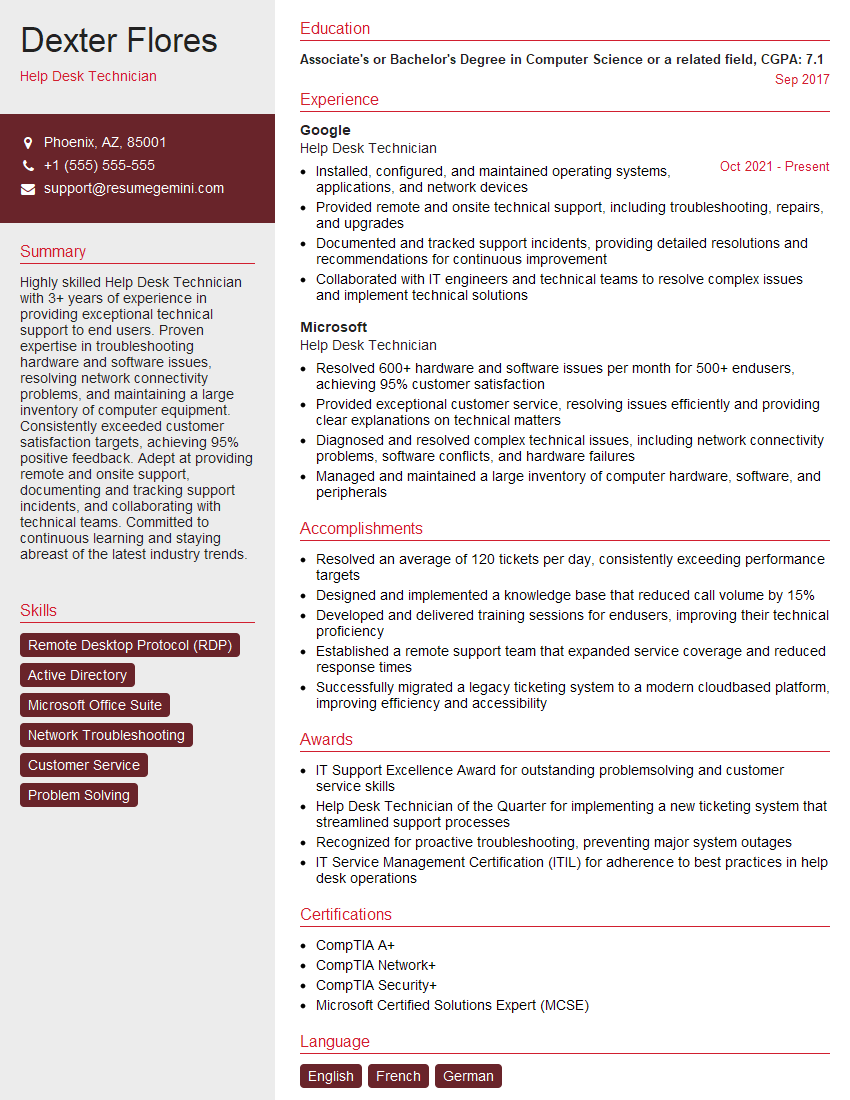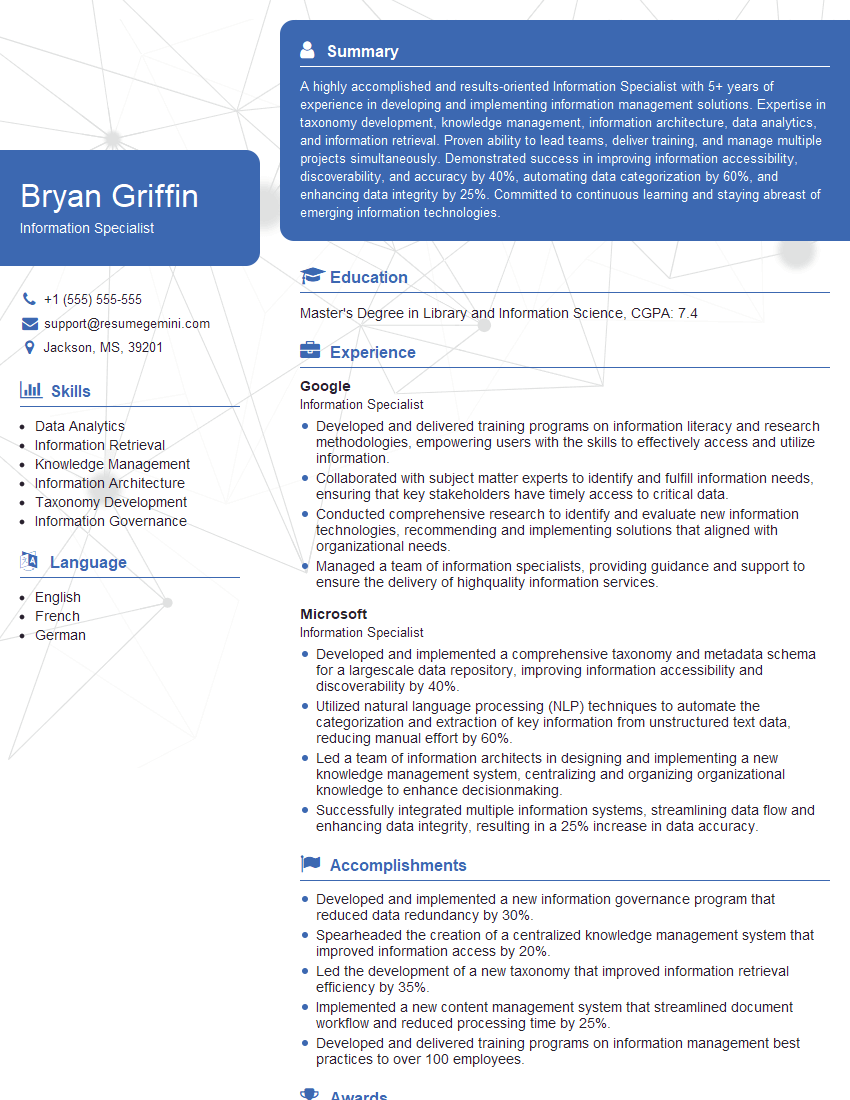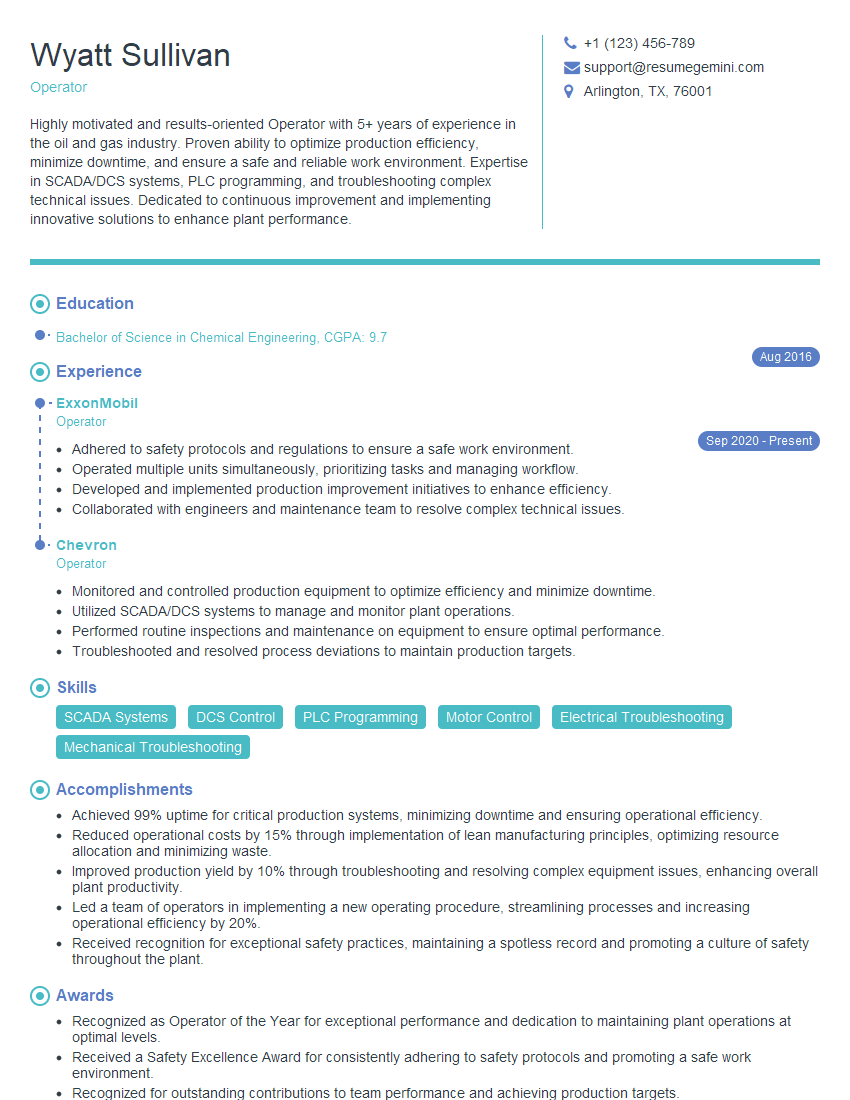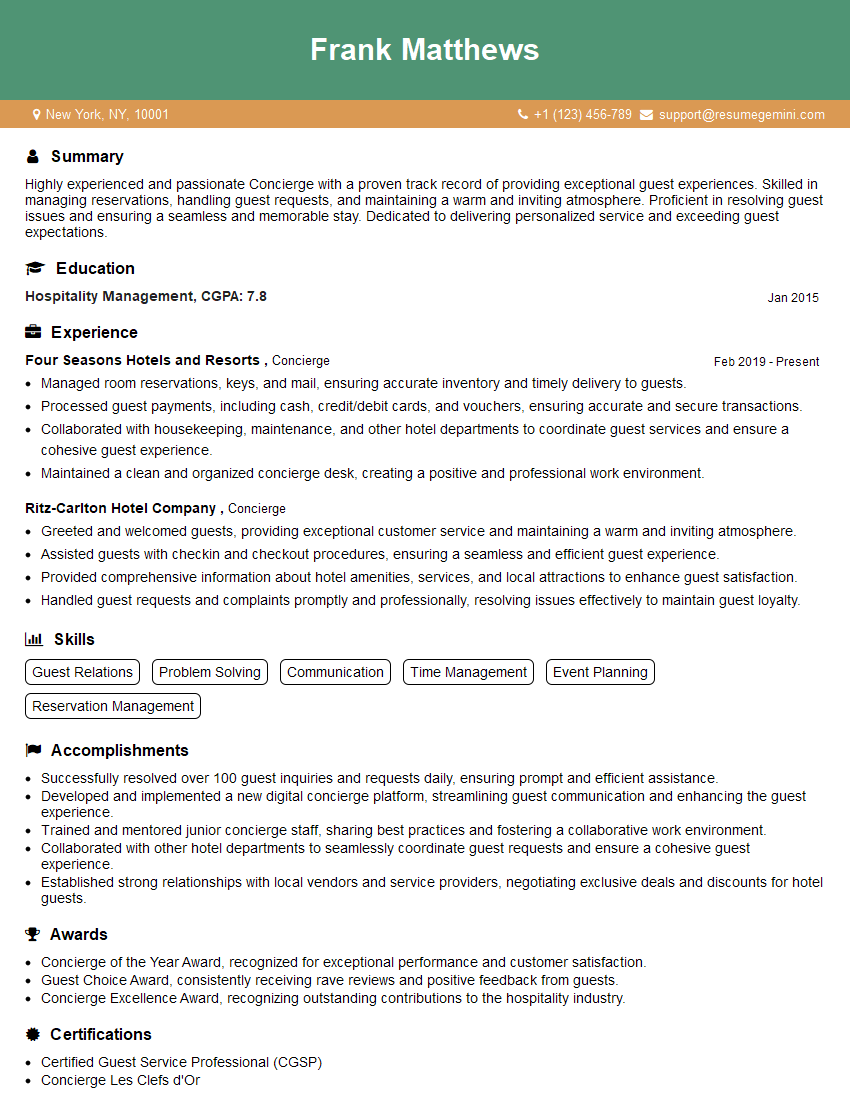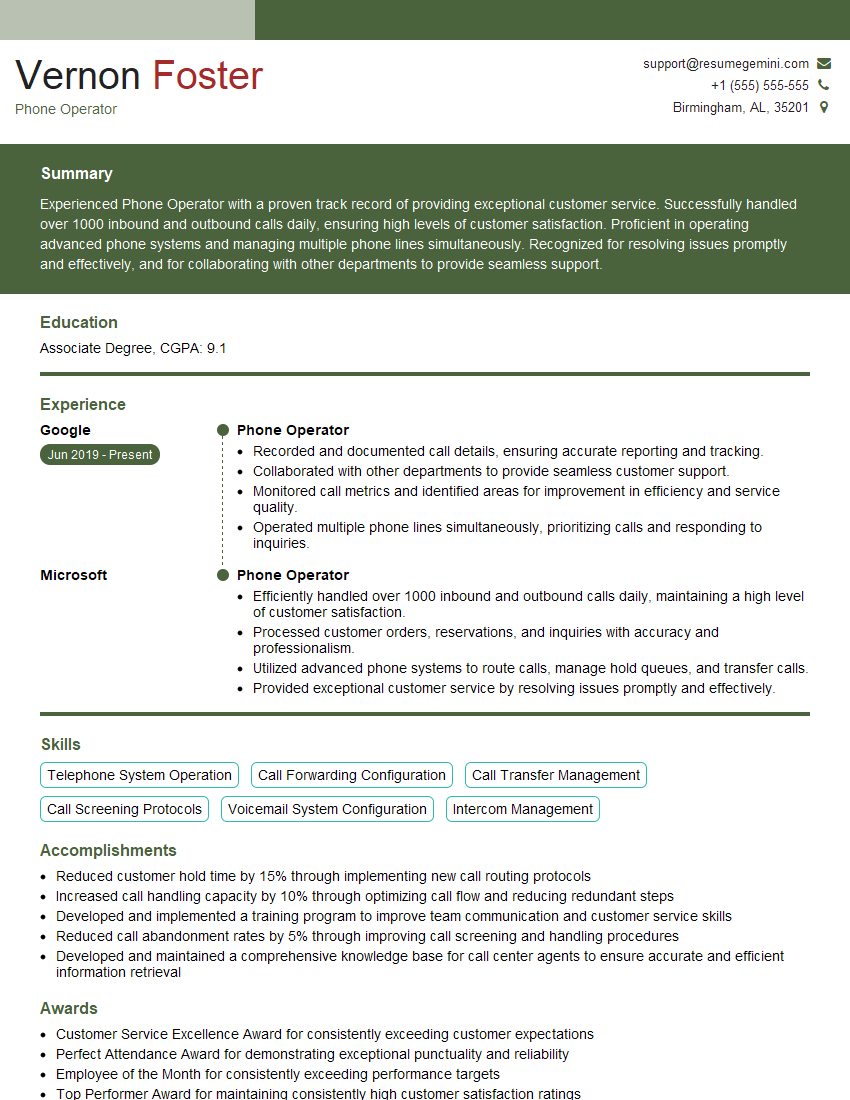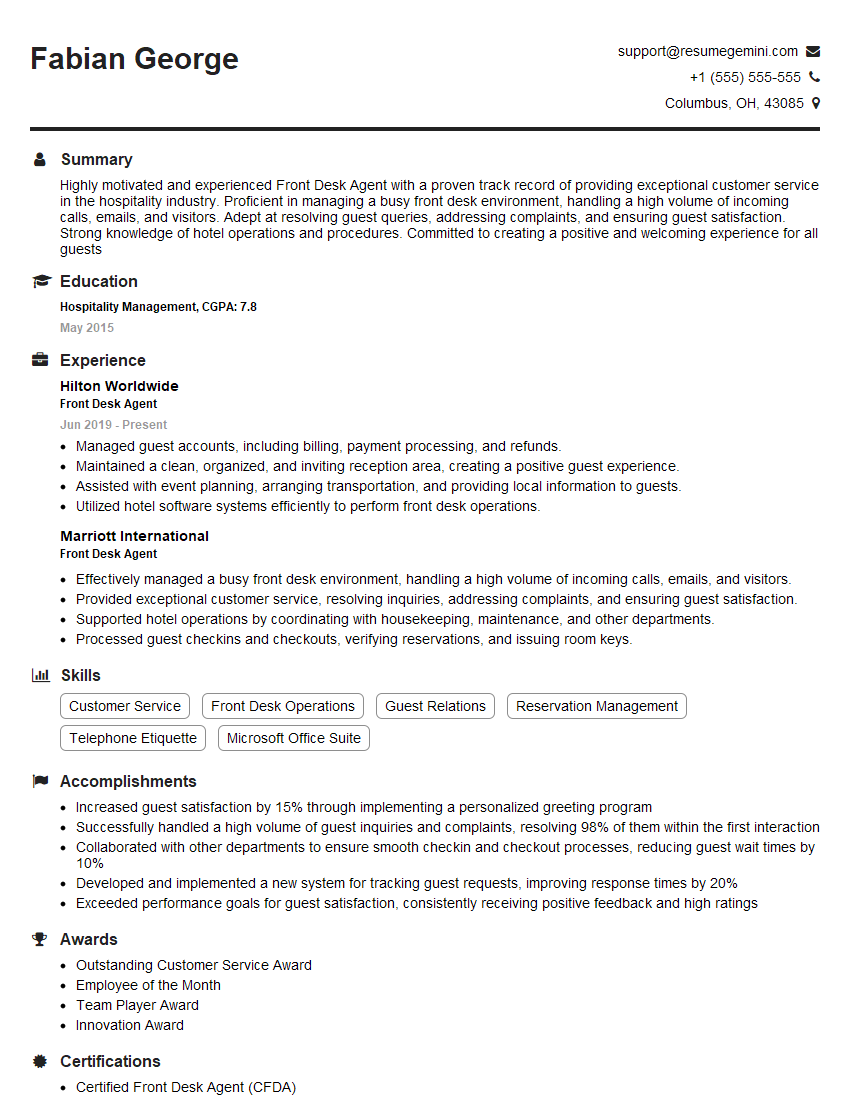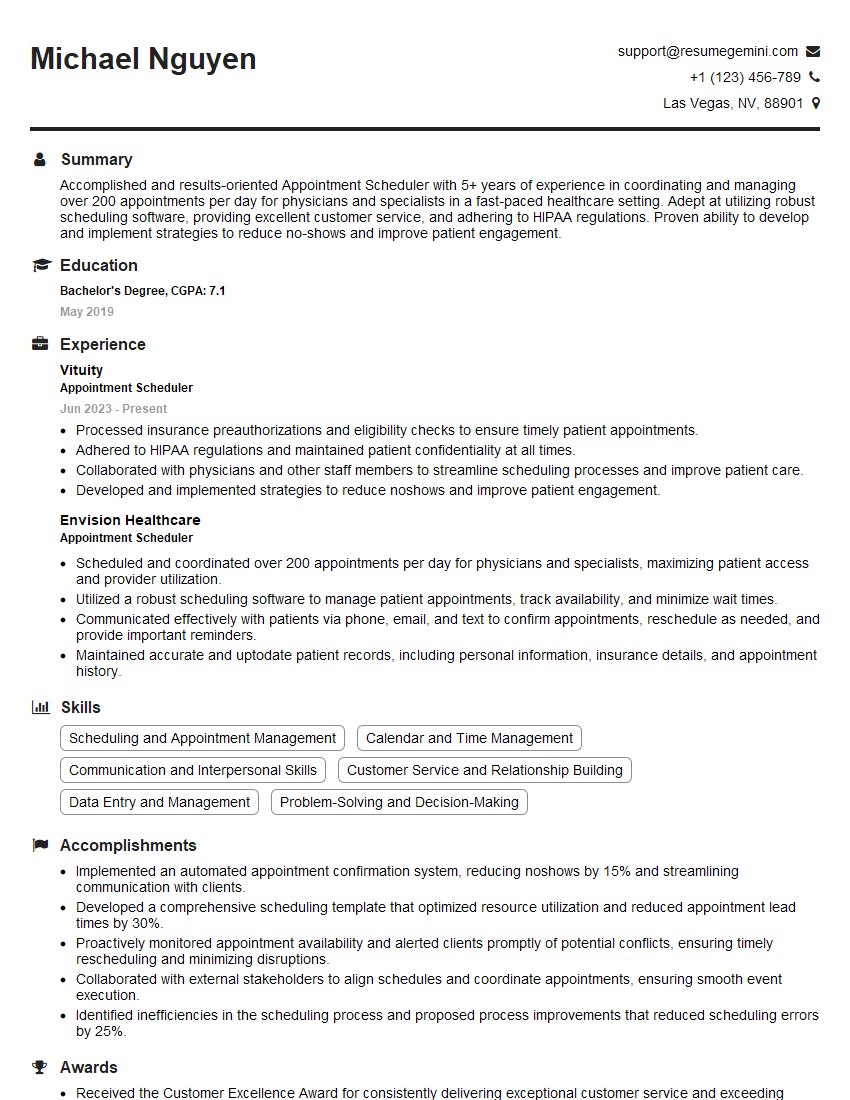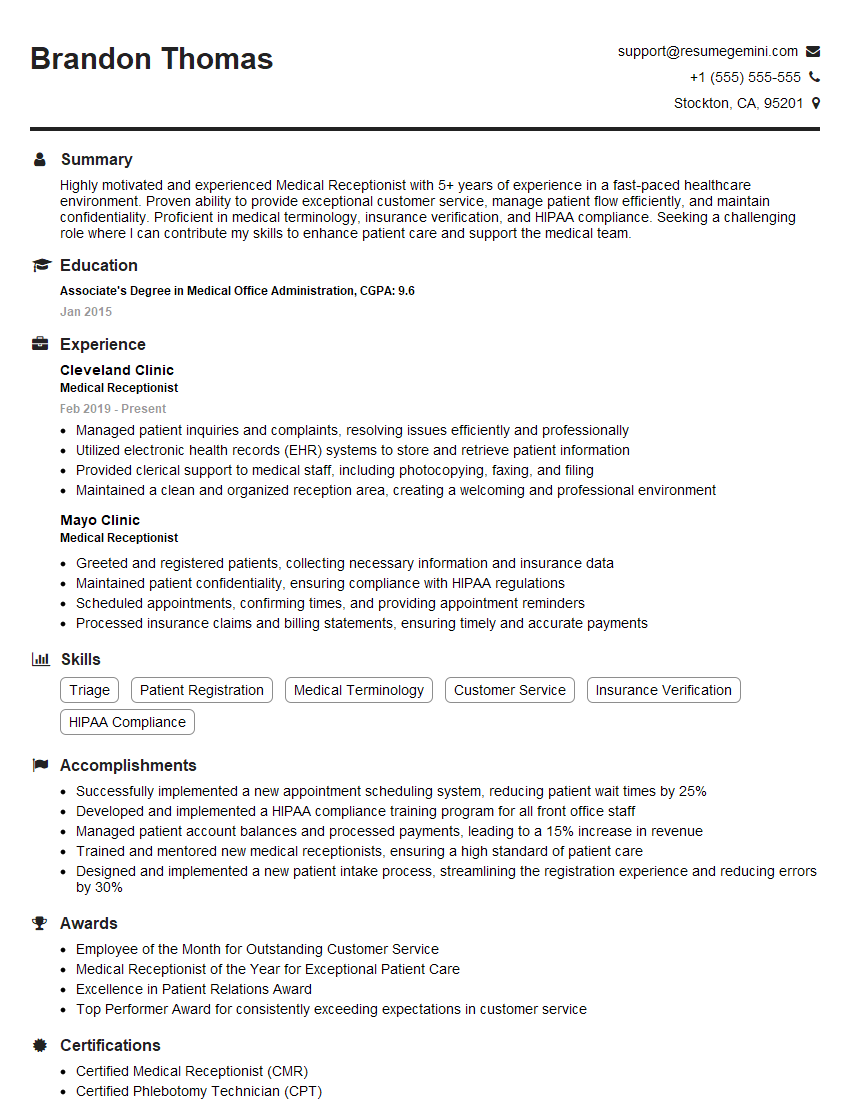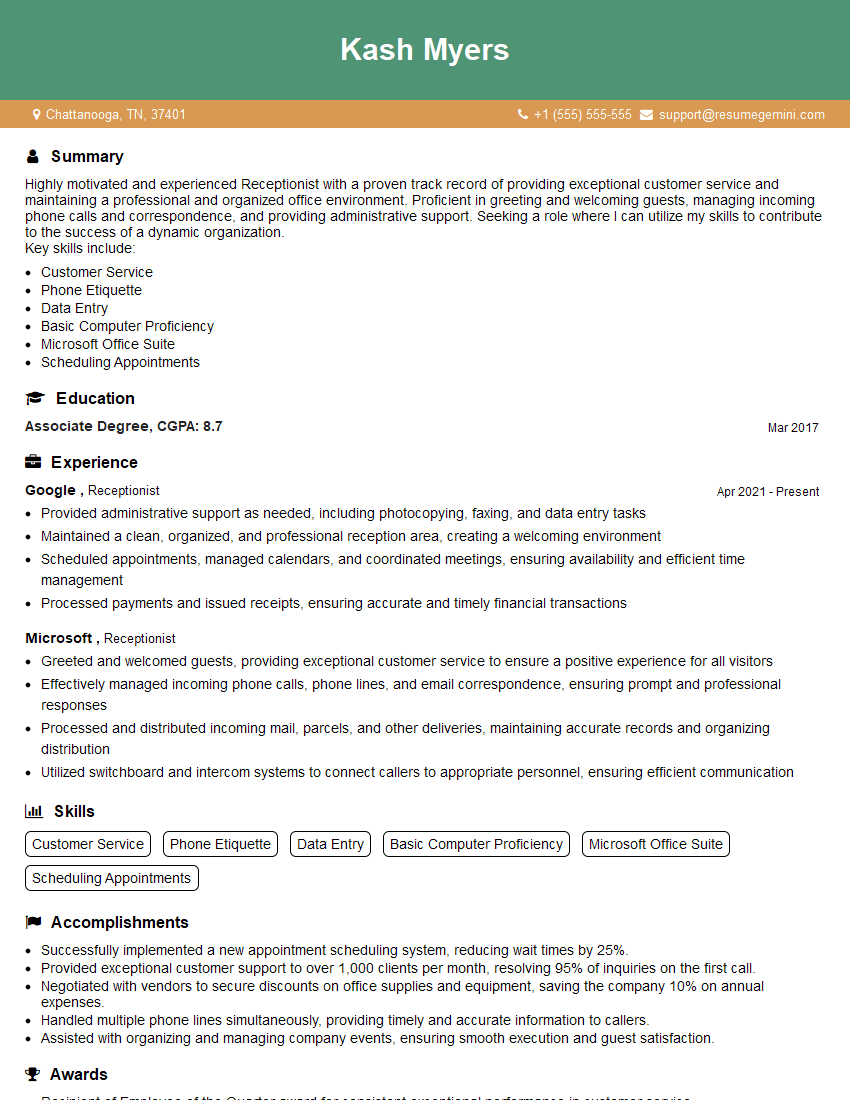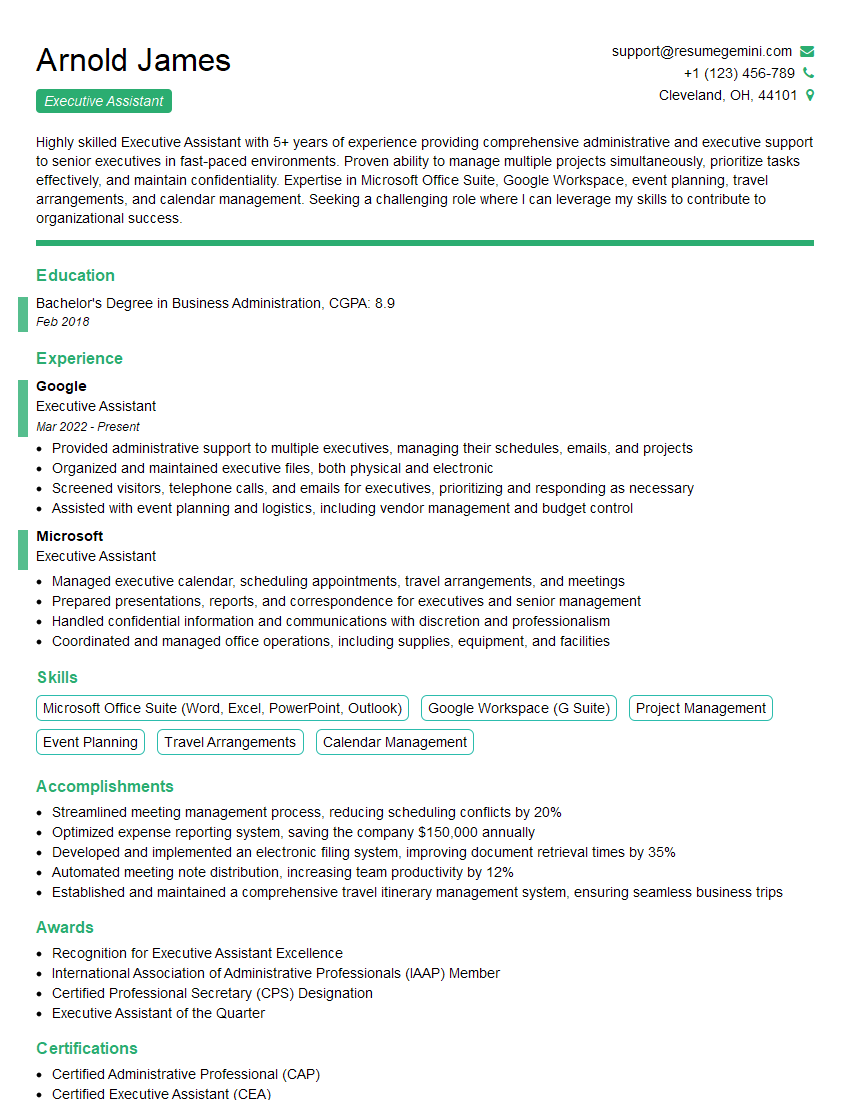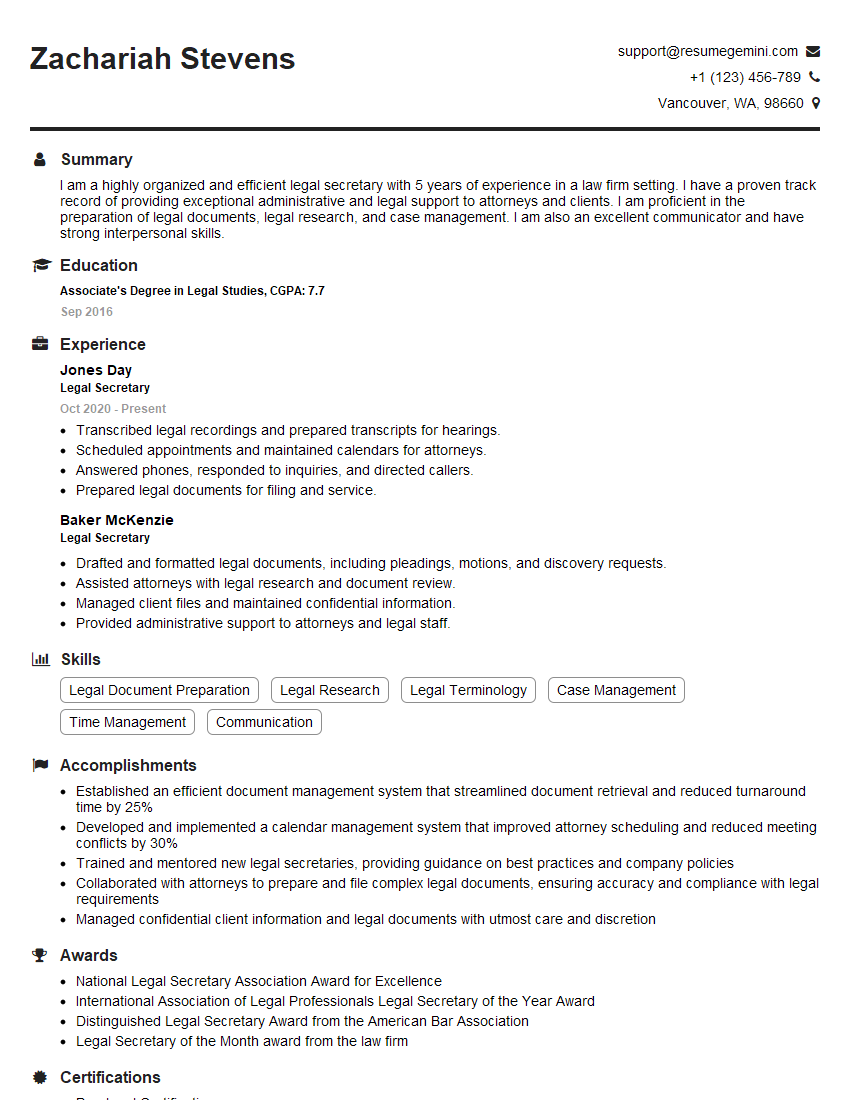Warning: search_filter(): Argument #2 ($wp_query) must be passed by reference, value given in /home/u951807797/domains/techskills.interviewgemini.com/public_html/wp-includes/class-wp-hook.php on line 324
Preparation is the key to success in any interview. In this post, we’ll explore crucial Answering Phone Calls interview questions and equip you with strategies to craft impactful answers. Whether you’re a beginner or a pro, these tips will elevate your preparation.
Questions Asked in Answering Phone Calls Interview
Q 1. Describe your experience handling high call volumes.
Handling high call volumes is a crucial skill in many customer-facing roles. My experience involves efficiently managing periods of significantly increased call traffic, maintaining a high level of service even under pressure. In my previous role at [Previous Company Name], we experienced peak call volumes during the holiday season, often exceeding 200 calls per day. I successfully navigated this by utilizing efficient call handling techniques such as prioritizing urgent calls, using call-back options effectively for less urgent inquiries, and maintaining a calm and professional demeanor to manage my own stress and prevent it from affecting the caller’s experience.
For example, during a particularly busy Black Friday sale, I utilized active listening to quickly identify the caller’s needs and direct them to the appropriate resource. This prevented call escalation and significantly improved call resolution times, contributing to higher customer satisfaction scores.
Q 2. How do you prioritize calls during busy periods?
Prioritizing calls during busy periods requires a combination of skills and systems. I typically follow a tiered approach: Emergency/urgent calls take precedence – think customers reporting critical issues or security breaches. Next, I prioritize calls from high-value clients or those with pre-scheduled appointments. Then come routine inquiries and general customer service calls. Finally, calls requiring detailed information or extended handling might be placed on a callback list if the immediate workload is too high.
Imagine a scenario where a customer is reporting a system failure impacting their business. That call jumps to the front of the line. A routine inquiry about account balance can wait while I address the critical issue first. This approach ensures that the most important needs are met promptly and efficiently.
Q 3. Explain your process for taking detailed messages.
Taking detailed messages is critical for ensuring smooth communication and follow-up. My process involves confirming the caller’s name, contact information, and the reason for their call. I actively listen to understand the key details, confirming them with the caller to ensure accuracy. I then neatly document the message, including any relevant account numbers, specific requests, and preferred contact methods. I always provide an estimated timeframe for a return call or follow-up.
For example, if a customer calls to report a billing discrepancy, I’ll document the account number, the disputed amount, the dates involved, the nature of the discrepancy, and the customer’s preferred method of receiving a response – email, phone, or mail. This detailed information ensures the appropriate team member can promptly and efficiently resolve the issue.
Q 4. How do you handle irate or difficult callers?
Handling irate or difficult callers requires patience, empathy, and strong communication skills. My approach begins with active listening to understand their concerns. I validate their feelings without necessarily agreeing with their perspective – phrases like “I understand your frustration” or “I can see why you’d be upset” go a long way. I then attempt to find a solution or at least explain the steps needed to address the issue. Maintaining a calm and professional tone, even under pressure, is paramount. If the call becomes excessively abusive, I will politely but firmly inform them that their behavior is unacceptable and that I need to disconnect the call if it continues.
I recall a situation where a customer was extremely angry about a delayed delivery. By actively listening and acknowledging his frustration, I was able to explain the reasons for the delay and offer a solution, such as a discount on their next purchase or expedited shipping. This de-escalated the situation, and the customer expressed his appreciation for my understanding and help.
Q 5. What strategies do you use to ensure accurate call routing?
Accurate call routing is essential for efficient call handling. I ensure this by using a combination of techniques. I rely on thorough knowledge of the company’s organizational structure and the different departments. I utilize call routing systems effectively – listening attentively to the caller’s needs to identify the correct department or individual. I ask clarifying questions if needed to avoid misdirection. A deep understanding of our service offerings allows me to quickly and accurately route calls to the appropriate team.
For instance, if a caller is inquiring about technical support, I directly connect them to the technical support team without any delays. If they have a billing query, I route them to the billing department efficiently. This avoids unnecessary delays and improves the overall caller experience.
Q 6. Describe your experience using a multi-line phone system.
My experience with multi-line phone systems is extensive. I’m proficient in managing multiple calls simultaneously, placing callers on hold politely, transferring calls efficiently, and utilizing features such as call waiting and conference calling. I understand the importance of utilizing these features to streamline call handling, maximize efficiency, and ensure smooth transitions between calls. I’m familiar with various systems, including [Mention specific systems if applicable], and can quickly adapt to new systems if required.
In a busy environment, managing multiple calls effectively, such as utilizing the hold function appropriately and transferring calls efficiently, allows me to handle a larger volume of calls while maintaining a high quality of service. Efficient use of a multi-line system minimizes wait times for callers and ensures their issues are handled swiftly.
Q 7. How do you maintain professionalism while answering calls?
Maintaining professionalism while answering calls is paramount. This starts with answering the phone promptly and identifying myself and my organization clearly. I use a pleasant and professional tone, avoiding slang or casual language. I actively listen to the caller and treat them with respect. I maintain a positive attitude, even during stressful situations. I pay close attention to my verbal and non-verbal communication; a calm and confident demeanor helps to create a positive interaction.
For example, answering with a clear and enthusiastic “Thank you for calling [Company Name], this is [Your Name], how may I assist you?” sets a positive tone for the entire call. A consistent, professional demeanor ensures the caller feels valued and respected, regardless of the reason for their call.
Q 8. How familiar are you with various phone systems (e.g., VoIP)?
I possess extensive experience with various phone systems, including traditional PBX systems and modern VoIP (Voice over Internet Protocol) solutions. My familiarity extends beyond basic operation to include understanding their underlying architectures and functionalities. For instance, I’m comfortable working with cloud-based VoIP systems like RingCentral or 8×8, understanding their features such as call routing, voicemail-to-email, and call queuing. I also have experience with on-premise PBX systems, troubleshooting issues related to hardware and software configurations. The key difference I understand between these systems is the reliance on internet infrastructure for VoIP, which presents unique troubleshooting challenges compared to traditional, landline-based systems. I can adapt quickly to any phone system due to my solid understanding of general telephony principles.
Q 9. What is your experience with call recording and logging systems?
I have extensive experience with call recording and logging systems. In previous roles, I’ve utilized systems that integrate directly with our phone systems, capturing calls for quality assurance, training, and legal compliance. This includes both on-premise systems and cloud-based solutions. I understand the importance of data security and compliance within these systems, ensuring that recordings are stored securely and only accessed by authorized personnel. My experience includes familiarizing myself with the system’s interface to locate specific calls using search parameters like date, time, and caller ID. I also understand the importance of regular maintenance and backups for these systems to maintain data integrity and availability. For example, I’ve used systems that provide detailed call logs including call duration, disposition (e.g., answered, missed, abandoned), and agent information. This data is invaluable for performance analysis and identifying areas for improvement.
Q 10. How do you handle calls outside of your regular working hours?
Handling calls outside of regular working hours depends on the specific company policy and the nature of the business. In past roles, we’ve utilized various methods. For urgent matters, an on-call rotation ensures someone is always available to address critical issues. This is usually communicated via a dedicated phone line and an on-call schedule. For less urgent calls, we often employ a voicemail system with clear instructions and appropriate call-back procedures. The voicemail clearly outlines the working hours and provides guidance on how to reach the appropriate department or individual in case of urgency. This system ensures that all calls are acknowledged while protecting employee time outside of working hours. The key is clear communication and setting appropriate expectations with clients and customers about response times outside of standard business hours.
Q 11. How would you handle a misdial or wrong number?
When a misdial or wrong number occurs, my approach is polite and efficient. I would begin by politely confirming with the caller that they have reached the wrong number. I’d then provide a brief and apologetic statement, such as, “I believe you may have reached the wrong number. I apologize for any inconvenience.” I avoid disclosing sensitive company information. Finally, I’ll disconnect the call promptly. If the caller seems confused or unsure, I might offer a brief suggestion, such as checking the number they dialed against their contact list. The goal is to be helpful and courteous while protecting the company’s information and minimizing time spent on unproductive calls. In essence, my approach prioritizes courtesy and efficiency.
Q 12. What’s your approach to handling confidential information during a phone call?
Handling confidential information during a phone call requires strict adherence to company policies and best practices. My approach includes verifying the caller’s identity before discussing any sensitive data. I confirm their identity using multiple data points, where possible. I am mindful of my surroundings, ensuring privacy and avoiding public spaces where conversations might be overheard. I never leave confidential information unattended on my desk or computer. If a call needs to be transferred to another person, I make sure that the transfer is secure and compliant. I avoid discussing sensitive information if there is any hint of a potential security risk. My commitment to data security and privacy is paramount, and I always prioritize protecting sensitive information.
Q 13. Describe a time you had to deal with a technically challenging call.
In a previous role, I received a call from a client experiencing significant technical difficulties with our software. They were unable to access key features, and their frustration was evident. After calmly listening to their description of the issue, I systematically worked through troubleshooting steps. This included verifying their internet connection, checking for software updates, and confirming their login credentials. I then escalated the issue to our technical support team, providing them with all the necessary information to efficiently resolve the problem. Following up with the client after the issue was resolved showed them we valued them, even during a difficult situation. The successful resolution came from using a structured problem-solving approach combined with clear and empathetic communication.
Q 14. Explain your method for verifying caller identity.
My method for verifying caller identity depends on the sensitivity of the information being discussed. For routine calls, confirming their name and reason for calling is usually sufficient. For more sensitive matters, I may ask for additional information such as account numbers, dates of birth, or other identifying details. The specific verification method is guided by company policies and the level of risk associated with the information. I always remain vigilant and attentive to potential fraud or phishing attempts. If I suspect any suspicious activity, I will immediately report it to the appropriate authorities or my supervisor. The key is a measured approach tailored to the circumstances, always prioritizing security and accuracy.
Q 15. How do you handle emergency calls?
Handling emergency calls requires immediate action and a calm demeanor. My priority is to assess the situation quickly and efficiently. I begin by actively listening to understand the nature of the emergency. This involves asking clarifying questions while remaining empathetic and reassuring. Then, I follow established protocols. This might involve connecting the caller to the appropriate emergency services (911, internal emergency response team, etc.) or to a designated supervisor who can manage the situation. After transferring the call or taking the necessary steps, I document the incident, including the time, the caller’s information (if provided), and the actions taken. For example, if someone reports a fire, I wouldn’t attempt to solve the issue myself; I’d immediately connect them with the fire department and get their address and any further relevant details.
My training ensures that I stay calm under pressure. I employ techniques like deep breathing to control my own anxiety and project a calming presence to the caller, reducing their stress during a critical moment. I practice regularly on simulated emergency calls to refine my response time and efficiency.
Career Expert Tips:
- Ace those interviews! Prepare effectively by reviewing the Top 50 Most Common Interview Questions on ResumeGemini.
- Navigate your job search with confidence! Explore a wide range of Career Tips on ResumeGemini. Learn about common challenges and recommendations to overcome them.
- Craft the perfect resume! Master the Art of Resume Writing with ResumeGemini’s guide. Showcase your unique qualifications and achievements effectively.
- Don’t miss out on holiday savings! Build your dream resume with ResumeGemini’s ATS optimized templates.
Q 16. How would you handle a call from a VIP or executive?
Calls from VIPs or executives demand a higher level of professionalism and discretion. I’d begin by identifying the caller (if not already known) and using their preferred title and name respectfully. My tone would be courteous, professional, and efficient. If connecting them to someone else, I’d preface the call with their name and title to ensure a smooth transition. If I am taking a message, I’d do so with meticulous attention to detail, ensuring accuracy in recording the information. I’d prioritize their calls and try my best to address any requests or concerns promptly and effectively. In many organizations, VIP calls have specific routing or escalation procedures that are followed to ensure their needs are met.
For instance, if a CEO calls, I wouldn’t just transfer them immediately without first confirming availability with their assistant or inquiring about the nature of the call (unless it was explicitly an emergency). This shows respect for their time and position.
Q 17. What are your skills in using phone systems to transfer calls effectively?
I am proficient in using various phone systems to efficiently transfer calls. My skills extend across different platforms, including traditional PBX (Private Branch Exchange) systems and modern VoIP (Voice over Internet Protocol) solutions. I understand how to utilize features like blind transfers, attended transfers, conference calls, and call forwarding to optimize the call routing process. I am also familiar with using call queues and call distribution systems to ensure that incoming calls are handled effectively, especially during peak times.
For example, using an attended transfer in a PBX system involves first connecting to the intended recipient and confirming their availability before connecting the caller, ensuring a smoother transition. With VoIP, I can utilize features like presence indicators to see if someone is available before transferring a call. Understanding the nuances of each system and leveraging its features is crucial to efficiently manage and route calls.
Q 18. How do you manage your time effectively when answering multiple calls simultaneously?
Managing multiple calls simultaneously demands excellent organizational skills and multitasking abilities. I prioritize calls based on urgency. Emergency calls always take precedence. For other calls, I may briefly acknowledge the second call while addressing the first, then swiftly switch between them using techniques like holding one line briefly while dealing with the other. Using call waiting and efficient note-taking helps me maintain context and ensures no details are lost between calls. It’s about strategic prioritization and a clear understanding of what requires immediate attention.
I also use call-handling software to assist with managing multiple calls and tracking conversations. This helps to minimize the risk of overlooking or mishandling calls.
Q 19. How do you stay calm and professional under pressure?
Maintaining composure and professionalism under pressure is essential. I utilize several techniques to stay calm, including deep breathing exercises, taking short breaks when possible, and practicing mindfulness. I focus on speaking clearly and slowly, using a reassuring and empathetic tone of voice. I try to see each call as a separate opportunity to provide excellent customer service, irrespective of any stress or pressures.
Remember, your attitude is contagious. If you appear calm and composed, it often calms the caller as well. I actively avoid letting my own stress transfer to the caller. I see stressful situations as challenges that I can overcome efficiently and professionally.
Q 20. How do you ensure caller satisfaction?
Ensuring caller satisfaction is my top priority. This involves providing prompt, efficient, and courteous service. I actively listen to the caller’s concerns, ask clarifying questions to understand their needs, and respond promptly and helpfully. My goal is to resolve their issue or direct them to the appropriate person or resource. I always aim to end the call on a positive note, thanking them for calling and ensuring they feel valued. Following up on any promises or actions taken is also crucial to build trust and maintain satisfaction.
For instance, if I can’t immediately help a caller, I provide an estimated time frame for a solution and follow-up as promised. This commitment to follow-through demonstrates professionalism and reinforces trust.
Q 21. Describe your experience with different types of phone systems (e.g., PBX, VoIP).
I have extensive experience with different types of phone systems, including PBX and VoIP. I understand the functionalities, advantages, and limitations of each system. PBX systems offer robust features like call routing, voicemail, and conferencing, particularly useful in larger organizations. VoIP systems, on the other hand, offer flexibility, scalability, and cost-effectiveness through internet connectivity, allowing for remote work and integration with other communication tools. I am familiar with various vendors and their respective platforms.
My experience also includes working with cloud-based phone systems, which offer a blend of PBX and VoIP functionalities, often simplifying setup and management. I’m capable of adapting quickly to new systems and learning new features as needed. This adaptability is crucial in this constantly evolving technological landscape.
Q 22. How do you handle calls when the person being called is unavailable?
When a person is unavailable, my priority is to provide excellent customer service even in their absence. I never leave a caller on hold indefinitely. My approach is multifaceted.
Offer to take a message: I politely inform the caller that the individual is unavailable and ask if they’d like to leave a message. I make sure to get all necessary information, including their name, phone number, and a concise summary of their reason for calling. For example, I might say, “Thank you for calling. Unfortunately, [person’s name] is unavailable at the moment. May I take a message?”
Offer alternative contact information: If appropriate, I offer alternative contact methods, such as an email address or another person who can assist. This shows initiative and a commitment to helping the caller. For instance, I might add, “Alternatively, you could try emailing [email address] or contacting [alternative contact’s name] at [number].”
Provide an estimated time of return: If I have an idea of when the person will be available, I share that information to manage caller expectations. For example: “[Person’s name] is currently out of the office, but is expected back around 2 pm. Would you like to leave a message, or call back later?”
Use a professional voicemail system (if applicable): If the company uses a sophisticated voicemail system with features like call-back requests or email message notifications, I utilize those tools to streamline the process and ensure timely responses.
This approach ensures that the caller feels valued and that their needs are addressed, even when the intended recipient isn’t immediately available.
Q 23. How would you deal with a caller who is not clear in their request?
Dealing with unclear requests requires patience, active listening, and skillful questioning. It’s about guiding the caller to articulate their needs effectively.
Clarifying questions: I use open-ended questions to encourage the caller to elaborate. Instead of asking “yes” or “no” questions, I ask things like, “Can you tell me more about what you’re experiencing?” or “Could you describe the problem in more detail?”
Summarizing and paraphrasing: To ensure understanding, I regularly summarize and paraphrase the caller’s statements. For example, I might say, “So, if I understand correctly, you’re experiencing issues with [problem]. Is that right?” This helps identify any misunderstandings early on.
Active listening: Paying close attention to both verbal and non-verbal cues (tone of voice, pauses) helps me understand the caller’s underlying message. Sometimes, frustration or urgency are implied rather than explicitly stated.
Patience and empathy: Remaining calm and patient is crucial. I acknowledge the caller’s frustration and offer my assistance in resolving the issue. A simple, “I understand your frustration, let’s work together to find a solution,” can go a long way.
By employing these techniques, I can often transform a confusing call into a productive one, effectively resolving the caller’s issue.
Q 24. What are some strategies for managing interruptions during a phone call?
Interruptions are inevitable, but effective management is key to maintaining professionalism and call efficiency. Here are some strategies:
Politely excuse yourself: If interrupted, I briefly and politely excuse myself from the call. For example, “Excuse me for one moment, please.” I keep it short and sweet to minimize disruption to the caller.
Minimize distractions: I strive to create a quiet and organized workspace to reduce potential interruptions before the call even begins.
Use call-waiting features: If possible, use call-waiting functions to place a second call on hold while managing the first one. This depends on company policy and call-handling software.
Take brief notes: If I need to look something up or confirm information, I briefly take notes to ensure I don’t lose track of the conversation. This shows efficiency and professionalism to the caller.
Prioritize and manage incoming calls: If I am reasonably certain that the incoming call is less urgent, I can politely ask the second caller to hold briefly before rejoining the original call. This balances the needs of multiple callers.
By proactively minimizing distractions and employing effective interruption-handling techniques, I ensure that every call receives my focused attention.
Q 25. Describe your experience with call monitoring and quality assurance.
I have extensive experience with call monitoring and quality assurance. In previous roles, I’ve participated in both the receiving and evaluating ends of call monitoring programs.
Call monitoring: I’ve been monitored to assess call handling skills, adherence to company protocols, and overall customer service quality. This feedback has been instrumental in refining my techniques.
Quality assurance: I’ve also participated in evaluating calls made by colleagues, providing constructive feedback and identifying areas for improvement in customer service delivery, compliance, and efficiency. I always use a balanced approach, highlighting strengths along with areas for improvement.
Calibration and training: In quality assurance, I’ve participated in calibration sessions with team members to standardize scoring criteria and ensure consistent evaluations across different raters.
Reporting and analysis: I understand the importance of documenting findings and preparing reports to identify patterns and areas for improvement within the team’s call-handling processes. This helps to improve team performance and enhance overall customer satisfaction.
This experience has provided me with a deep understanding of best practices in telephone etiquette, customer service, and communication. It has improved my ability to provide seamless and helpful service while upholding company standards.
Q 26. How familiar are you with HIPAA compliance when handling patient calls (for medical roles)?
HIPAA compliance is paramount in medical settings. I am very familiar with its regulations regarding the privacy and security of Protected Health Information (PHI). My understanding encompasses the following:
Confidentiality: I would never disclose PHI to unauthorized individuals. This includes verifying a patient’s identity before releasing any information. I’d always ask for identifying information in a private setting, or make sure to speak quietly and discreetly in a public space.
Access control: I would only access patient records when necessary and in accordance with authorized protocols. I understand the strict controls around access levels and wouldn’t attempt to access data outside of my purview.
Data security: I understand the importance of securing patient data, both electronically and physically. This includes following all company protocols on password management and data storage.
Patient authorization: I would always obtain proper authorization before releasing any information to third parties.
My commitment to adhering to HIPAA regulations is unwavering. I always prioritize the security and privacy of patient information. In a medical setting, it’s not simply good practice; it’s a legal obligation.
Q 27. How would you handle a call with a language barrier?
Encountering a language barrier requires a strategic approach to ensure clear communication and avoid misunderstandings. My approach includes:
Identifying the language: I would politely ask the caller to identify their preferred language.
Utilizing translation services: If I don’t speak the caller’s language, I would immediately utilize translation services (either phone-based or online) to facilitate communication. I would clearly explain this process to the caller.
Speaking slowly and clearly: Even with a translator, speaking slowly and clearly helps to ensure that the message is accurately conveyed. I’d avoid using jargon or complex sentences.
Seeking clarification: I would frequently ask clarifying questions to ensure that both parties fully understand the exchange. For example: “Could you please repeat that?” or “I want to ensure I understood correctly…”
Documenting the conversation: I’d keep detailed notes of the call, including any relevant information shared and the translator used.
Effective communication is essential, and I am adept at navigating language barriers to provide quality service regardless of language differences.
Q 28. What software or applications do you have experience using to support phone calls (e.g., CRM)?
I have experience with several software applications that enhance phone call efficiency and effectiveness. My proficiency includes:
CRM (Customer Relationship Management) systems: I have experience using various CRM platforms (e.g., Salesforce, HubSpot, Zoho CRM) to access customer information, track call history, manage contacts, and streamline workflows. I know how to efficiently access relevant customer data during a call for better customer service and personalized support.
Call center software: I’m comfortable using call center software with features like call recording, call routing, ACD (Automatic Call Distributor), IVR (Interactive Voice Response), and queue management. I know how to use these features effectively and understand their functions.
Voicemail systems: I’m experienced in managing voicemail systems, including setting up greetings, checking messages, and retrieving information for callers.
Microsoft Teams/Google Meet/Zoom: I have used these applications for making and receiving calls via video conferencing, providing remote support or holding virtual appointments as needed.
My familiarity with these systems allows me to effectively manage and handle various types of calls, optimizing workflow and communication.
Key Topics to Learn for Answering Phone Calls Interview
- Professional Phone Etiquette: Mastering a polite and professional tone, using appropriate greetings and closings, and handling interruptions effectively.
- Active Listening and Note-Taking: Developing the skill of actively listening to callers, accurately understanding their needs, and taking concise notes for follow-up.
- Call Routing and Transferring: Efficiently routing calls to the appropriate individuals or departments, while providing clear and helpful instructions to callers during transfers.
- Handling Difficult Calls: Developing strategies for managing upset or demanding callers with empathy and professionalism, while maintaining composure and resolving issues effectively.
- Message Taking and Delivery: Accurately recording and delivering messages, including all relevant details such as caller’s name, contact information, and the reason for their call.
- Using Phone Systems and Technology: Familiarizing yourself with different phone systems (e.g., PBX, VoIP), voicemail systems, and call recording software.
- Data Privacy and Confidentiality: Understanding and adhering to company policies regarding handling sensitive information and maintaining caller confidentiality.
- Problem-Solving and Decision-Making: Quickly assessing situations, making informed decisions, and resolving caller issues efficiently and effectively. This includes knowing when to escalate issues to a supervisor.
Next Steps
Mastering the art of answering phone calls is crucial for building a strong first impression and contributing positively to any team. It significantly impacts customer satisfaction and overall business success. To maximize your job prospects, focus on creating an ATS-friendly resume that showcases your skills and experience effectively. ResumeGemini is a trusted resource that can help you build a professional resume tailored to your specific experience and target roles. We provide examples of resumes tailored to Answering Phone Calls to guide you. Take the next step toward your career advancement today!
Explore more articles
Users Rating of Our Blogs
Share Your Experience
We value your feedback! Please rate our content and share your thoughts (optional).
What Readers Say About Our Blog
Hi, I represent a social media marketing agency that creates 15 engaging posts per month for businesses like yours. Our clients typically see a 40-60% increase in followers and engagement for just $199/month. Would you be interested?”
Hi, I represent an SEO company that specialises in getting you AI citations and higher rankings on Google. I’d like to offer you a 100% free SEO audit for your website. Would you be interested?
